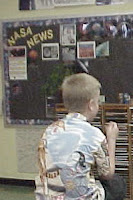For some reason today I was thinking about five-year-old Charles, a delightful little boy I knew years ago.
"I took the bus home from school today," he told me, "but my mom made me give it back." Then he waited with an expectant smile for the several seconds it took me to catch the pun!
 In A Parent’s Guide to Gifted Children (Great Potential Press, Inc., 2007), Webb, Gore, and Amend remind us: “By age five or six, a gifted child’s strong imagination and
creativity are often expressed in an unusually mature sense of humor.”
In A Parent’s Guide to Gifted Children (Great Potential Press, Inc., 2007), Webb, Gore, and Amend remind us: “By age five or six, a gifted child’s strong imagination and
creativity are often expressed in an unusually mature sense of humor.”
When teens are self-advocating, it's important for them to remember tip #9 from Galbraith and Delisle's 10 Tips for Talking to Teachers:
9. Bring your sense of humor.
Not necessarily the
joke-telling sense of humor, but the one that lets you laugh at yourself and your own misunderstandings and mistakes.













